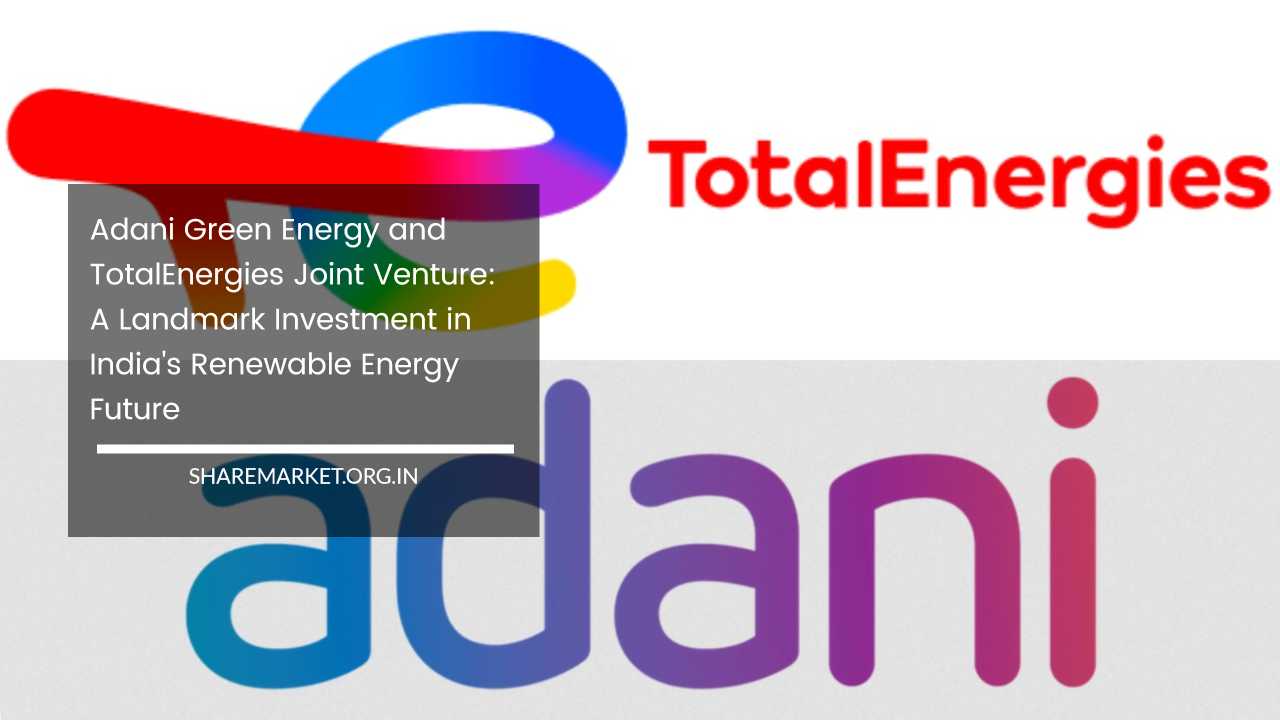Adani Green Energy and TotalEnergies Joint Venture: A Landmark Investment in India’s Renewable Energy Future

Adani Green Energy and TotalEnergies Joint Venture
On Wednesday, September 20th, the Indian stock market witnessed a notable development as the shares of Adani Green Energy Limited remained steady at INR 1,012.50 on the Bombay Stock Exchange (BSE).
This price stability was the result of a significant strategic move involving Adani Green Energy and the French energy company, TotalEnergies SE, which had entered into a binding agreement.
The agreement outlined the formation of a joint venture and TotalEnergies’ commitment to invest an additional $30 million. Adani Green Energy, on its part, would contribute valuable assets to this new collaboration.
This announcement, made by Adani Green Energy on September 20th, had a considerable impact on the financial market and drew the attention of investors, analysts, and industry experts.
The statement released to the stock markets provided crucial details about the joint venture’s structure, the extent of TotalEnergies’ investment, and the potential implications of this partnership in the renewable energy sector.
The joint venture, which is yet to be finalized in its entirety, is expected to encompass a portfolio of 1,050 MWac, including both solar and wind power assets.
Within this portfolio, there are assets already operational (300 MWac), assets under construction (500 MWac), and assets under development (250 MWac).
One of the notable aspects of this collaboration is that Adani Green Energy and TotalEnergies will share an equal 50-50 partnership in the new joint venture. This signifies a balanced and mutually beneficial approach to renewable energy investments.
As mentioned earlier, the transaction details have not been finalized as of the current stage, but discussions regarding the specific terms of the agreement will be carried out by both companies in definitive agreements.
This step is essential to ensure that the interests and expectations of both Adani Green Energy and TotalEnergies are appropriately addressed and aligned.
TotalEnergies’ involvement in Adani Green Energy is not entirely new. Prior to this announcement, TotalEnergies already held a 19.75% stake in Adani Green Energy through its affiliated entities.
This existing partnership serves as a foundation for the expanded collaboration, indicating a continued trust and confidence in Adani Green Energy’s potential and the renewable energy market in India.
The news of this significant development had been circulating in financial circles for some time before the official announcement.
Earlier reports, citing sources, had hinted that TotalEnergies could potentially invest up to $70 million in Adani Green Energy projects.
Such substantial investments signify the growing interest of international energy companies in India’s renewable energy sector, which has been gaining momentum due to the country’s ambitious renewable energy targets and conducive regulatory environment.
Patrick Pouyanné, the CEO of TotalEnergies, had previously expressed optimism about his company’s investment in both Adani Total Gas and Adani Green Energy. In February of the same year, he had stated that the investment of $3.1 billion was a favorable move.
The confidence demonstrated by TotalEnergies in Adani Green Energy underscores the potential for substantial returns and growth opportunities in India’s renewable energy market.
The renewable energy sector in India has been witnessing remarkable growth in recent years. The Indian government’s commitment to achieving its renewable energy targets, including a substantial increase in solar and wind power capacity, has created a conducive environment for both domestic and international players.
India’s abundant renewable energy resources, favorable policies, and initiatives have made it an attractive destination for investments in clean and sustainable energy.
One of the primary drivers of growth in the Indian renewable energy sector is the increasing demand for clean energy sources to reduce greenhouse gas emissions and combat climate change.
As the world grapples with the challenges of climate change, countries like India are actively transitioning to cleaner and more sustainable energy solutions.
This transition not only addresses environmental concerns but also presents significant economic opportunities.
Solar energy, in particular, has gained prominence in India’s renewable energy landscape. The country’s geographical location and climate conditions make it ideal for harnessing solar power.
The Indian government’s initiatives, such as the Jawaharlal Nehru National Solar Mission, have played a pivotal role in promoting solar energy adoption and facilitating investments in solar projects.
Wind power is another crucial component of India’s renewable energy portfolio. The country boasts vast wind energy potential, especially in states like Tamil Nadu, Gujarat, Rajasthan, and Maharashtra.
Investments in wind farms and wind energy projects have been on the rise, contributing to the diversification of India’s renewable energy sources.
The joint venture between Adani Green Energy and TotalEnergies is expected to further accelerate the growth of renewable energy in India.
With a portfolio of 1,050 MWac and a strategic partnership that leverages the strengths and expertise of both companies, this collaboration is poised to make a significant impact on India’s renewable energy landscape.
The 50-50 ownership structure of the joint venture ensures that both Adani Green Energy and TotalEnergies have equal stakes in the success of the venture.
This balance of ownership reflects a commitment to shared responsibilities and mutual benefits. It also underscores the collaborative spirit required to address the complex challenges of scaling up renewable energy infrastructure.
While the specifics of the transaction are still being finalized, it is essential to highlight the broader implications of this collaboration.
First and foremost, it signifies the confidence of global energy giants like TotalEnergies in the potential of India’s renewable energy market.
This confidence is not limited to a single project but extends to a long-term partnership that aims to drive sustainable growth in the sector.
Additionally, the investment by TotalEnergies underscores the financial viability of renewable energy projects in India.
The commitment of significant capital to this joint venture is a testament to the attractiveness of the Indian renewable energy market as an investment destination.
This could pave the way for further investments from international players, fostering healthy competition and innovation in the sector.
The joint venture’s diverse portfolio, comprising both operational and upcoming projects, ensures a holistic approach to renewable energy generation.
This approach aligns with India’s renewable energy goals, which include not only increasing capacity but also enhancing the efficiency and reliability of renewable energy sources.
As the world continues to grapple with the challenges of climate change, the role of renewable energy becomes increasingly vital.
Renewable energy sources such as solar and wind power offer a sustainable alternative to fossil fuels, reducing carbon emissions and mitigating the adverse effects of global warming. India’s commitment to expanding its renewable energy capacity contributes significantly to the global effort to combat climate change.
Moreover, the joint venture’s focus on renewable energy aligns with India’s ambitious targets for renewable energy capacity.
The Indian government has set a target of achieving 175 GW of renewable energy capacity by 2022 and 450 GW by 2030. These targets encompass various sources of renewable energy, including solar, wind, hydropower, and biomass.
The joint venture between Adani Green Energy and TotalEnergies contributes to the realization of these targets by adding substantial capacity to the renewable energy grid.
The Indian renewable energy sector also holds the potential to create significant employment opportunities. As renewable energy projects expand, they generate jobs across the value chain, from manufacturing and installation to operation and maintenance.
This job creation has positive socio-economic implications, especially in rural areas where many renewable energy projects are located.
Furthermore, the joint venture’s commitment to investing in assets under construction and under development demonstrates a forward-looking approach.
It acknowledges the importance of continually expanding renewable energy capacity to meet the growing energy demands of India’s rapidly developing economy.
The inclusion of assets at various stages of development ensures a sustainable pipeline of projects that can contribute to India’s energy security.
The stability and predictability of renewable energy sources, such as solar and wind power, are essential for maintaining a reliable and resilient energy supply.
Renewable energy can help reduce the country’s dependence on fossil fuels and mitigate the impact of energy price fluctuations. This, in turn, contributes to energy security and economic stability.
The joint venture’s investment in assets under construction also reflects a commitment to completing ongoing projects, thereby adding capacity to the grid in a relatively short timeframe.
This aligns with India’s goal of rapidly increasing renewable energy capacity to meet the growing energy demands of its population and industries.
Moreover, the partnership between Adani Green Energy and TotalEnergies is expected to drive innovation in renewable energy technologies and practices.
As both companies bring their expertise and resources to the table, they can collaborate on research and development initiatives aimed at enhancing the efficiency and sustainability of renewable energy projects.
This spirit of innovation can lead to the adoption of advanced technologies, improved project management practices, and greater cost-effectiveness in the renewable energy sector.
The joint venture’s potential to attract further investments into the Indian renewable energy sector is noteworthy. As international energy companies observe the success and growth of such collaborations, they may be encouraged to explore similar partnerships in India.
This influx of investments can catalyze the expansion of renewable energy infrastructure across the country, benefiting both urban and rural areas.
Furthermore, the joint venture has the potential to serve as a model for future collaborations in the renewable energy sector.
The equal partnership structure and the focus on a diverse portfolio of projects set a positive precedent for how international and domestic companies can work together to advance clean energy goals.
This collaborative approach can inspire other entities to pursue similar joint ventures, contributing to the broader objective of transitioning to a sustainable energy future.
The impact of this joint venture extends beyond the financial and economic realms. It aligns with India’s commitment to reducing its carbon footprint and addressing climate change.
Renewable energy sources are inherently low in carbon emissions, making them a critical component of India’s climate action strategy.
By expanding its renewable energy capacity, India can make significant strides in achieving its climate goals and fulfilling its international commitments.
In conclusion, the joint venture between Adani Green Energy and TotalEnergies represents a significant milestone in India’s renewable energy journey.
It reflects the growing recognition of India as a promising destination for renewable energy investments and the commitment of global energy leaders to contribute to India’s sustainable development.
The collaboration’s diverse portfolio, equal partnership structure, and focus on innovation position it as a catalyst for growth in the renewable energy sector.
As the world faces the urgent challenges of climate change, the expansion of renewable energy capacity in India takes on added significance.
It not only contributes to India’s energy security and economic growth but also serves as a beacon of hope in the global effort to combat climate change.
The joint venture exemplifies the transformative power of partnerships and underscores the pivotal role of renewable energy in shaping a more sustainable and resilient future for India and the world.

















